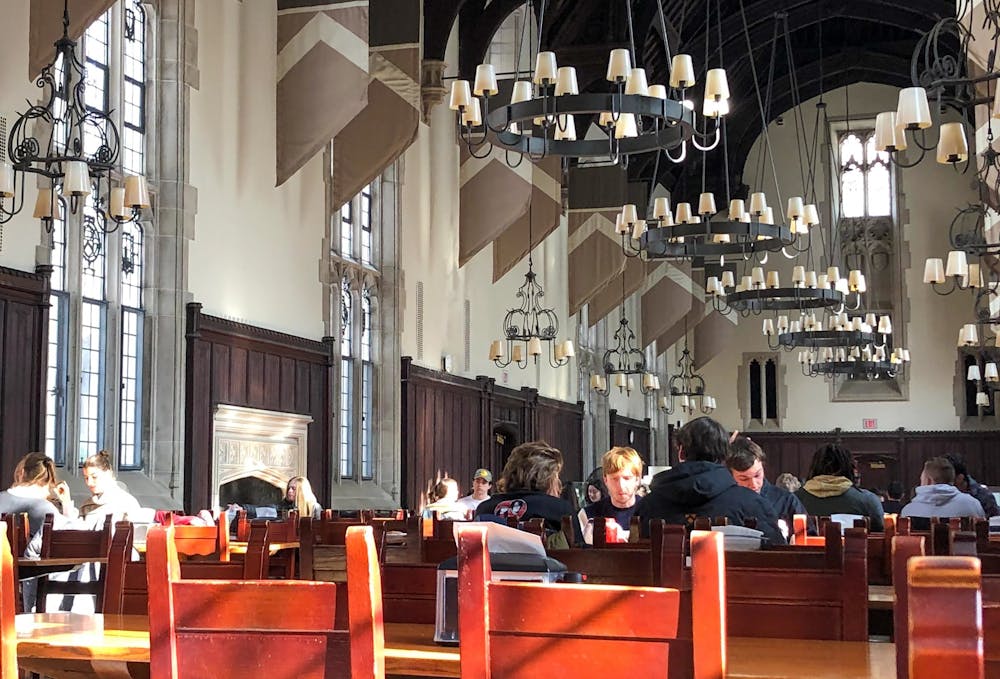During my time at Princeton, I’ve realized that unhealthy eating habits plague the student population. Whether it’s skipping meals or inconsistent eating schedules, Princeton students see proper nutrition as secondary, as they may feel too busy to prioritize eating. Some students are simply forced to skip meals due to class or extracurricular commitments.
While Princeton’s late meal program is intended to accommodate those who have irregular eating schedules, the food options are limited, and late meal operation hours don’t sufficiently accommodate those who spend hours studying after sunset. The main dining option for Princeton students who are hungry after 10p.m. is Wawa, which has limited choices and notoriously long lines. Third-party services such as DoorDash and Postmates are not allowed on campus grounds, and meeting delivery drivers off-campus grounds can be tedious, difficult, and time consuming. Moreover, some students simply get tired of food from dining halls, eating clubs, or Nassau Street.
I propose a solution to improve eating habits and provide more food options for students: TigerEats, a service that would deliver meals from third-party apps, dining halls, and eating clubs directly to a student’s location.
Nutrition experts agree that food is important for mental well-being. The brain requires certain foods to function properly. While students may feel that skipping meals saves them precious time that they can redirect to work and assignments, missing out on nutrition often affects the brain’s ability to think and leads to decreased cognitive performance. It can also be damaging to mental health: lower levels of nutrients have been linked to worse moods and increased likelihood of depression. Many Princeton students, who can be chronic meal-skippers due to their busy schedules, face these consequences.
TigerEats could give students more easily accessible food throughout campus. The program would offer students the choice of having food delivered to their dormitory building or to drop-off spots located at various busy locations around campus, such as Frist Campus Center and classroom buildings. This would ensure that students who are unable to go to dining facilities or restaurants would not skip a meal.
TigerEats could take the form of either a student-led startup initiative or a program subsidized by the University. Students using this food delivery service would be expected to pay a small fee for operation costs, in addition to the fees for third-party products. The exact logistics of this service would be sorted out based on demand and willingness of the Princeton administration to pursue such an endeavor. This type of student-led or student-staffed delivery service is feasible — look no further than Fordham University's “Raccoon delivery” and University of Florida’s BYPPOCampus.
With my proposal, if a student anticipates that they will miss a meal at the dining halls or their eating club, they could request a boxed meal through the TigerEats app. When the dining halls and eating clubs close, TigerEats staffers would pick up the items and distribute them to the student’s location. For third-party delivery services, delivery drivers would drop off food items at a station on the south end of campus, near Lot 20 where they could be picked up by delivery riders.
A potential argument is that TigerEats may actually perpetuate unhealthy eating habits rather than ameliorate them. Perhaps by giving students the opportunity to skip a visit to the dining hall, more may be tempted to replace the healthy options provided by the University with cheap and unhealthy meals. While it is true that unhealthy food options, such as fast food, would be more accessible through TigerEats, the harmful effects of forgoing a meal may be just as unhealthy, if not more, as eating fast food. Nutritionists generally agree that it’s better to eat an unhealthy meal than to eat nothing at all.
Relying on food delivery services may increase the likelihood of poor time management, where students find it acceptable to work through meals and are satisfied with a delivery in lieu of a break. While developing or encouraging poor time management skills is a valid concern, delivery services are usually available during any hour of the day in the ‘real world.’ For now, as students, Princetonians are constrained to the limited hours of dining halls and eating clubs, as well as limited restaurant options outside of campus — but this is not the case after graduation. Rendering delivery apps accessible only allows students the choice that will be available to them once they leave the Orange Bubble.
A service like TigerEats is one step to making Princeton healthier. This proposed program would benefit all students, from those who are stressed about their work, to those who have to skip meals due to classes, office hours, or unexpected schedule conflicts, in addition to students with work-study who have irregular working hours.
No student should have to skip a meal because of inflexible food options on campus.
Prince Takano is a junior from Los Angeles majoring in Politics. He can be reached via email at takano@princeton.edu. He is obliged to credit Professor Majora Carter and his peers from ENT200 Fall 2021 for inspiring him to write about this idea.









